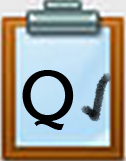Q1 What is a Global Collaborator?: Vocabulary
Key Vocabulary
Asynchronous Communication: To talk with another person or group of people by posting an idea online and getting responses at a later time. For example, this could happen with a discussion board or by posting videos. Asynchronous communication uses digital communication tools to work together with a time lag between responses.
Broadcast: An online (virtual) connection or video conference that is recorded for later use.
Collaborator: A person who works with others to achieve a common goal
Competence: The ability to do something successfully or efficiently.
Empathy: The ability to understand and share the feelings of another person; often called “putting yourself in the shoes of another."
Global collaborator: Someone who uses collaboration tools to explore complex ideas or problems from multiple viewpoints.
Online Communication: Using digital tools to communicate in written, audio, or video form, and presented either synchronously (same time) or asynchronously (at a later time).
Synchronous Communication: To talk to another person or a group of people live in a real-time conversation, either face-to-face or using a webcam. Synchronous communication uses digital communication tools to work together in real-time.
Virtual Connection: An online (virtual) tool to connect sites for the purposes of collaboration (connection) in real (live) time. It is also called “video conferencing.""
Virtual Meeting Room: An online (virtual) meeting space in a conferencing app or website where uploading digital files, having a space for chat, and/or recording are part of the workspace.
Webinar: An online meeting that is typically interactive, allowing the presenter to share information to a virtual audience.
Play the interactive Quizlet Game: Direct Link
Competencies & Standards
MITECS Michigan Integrated Technology Competencies for Students, and
1. Empowered Learner
a. Articulate and set personal learning goals, developing strategies leveraging technology to achieve them, and reflect on the learning process itself to improve learning outcomes
d. Understand the fundamental concepts of technology operations, demonstrate the ability to choose, use and troubleshoot current technologies and are able to transfer their knowledge to explore emerging technologies
2. Digital Citizen
a. Cultivate and manage their digital identity and reputation and are aware of the permanence of their actions in the digital world
b. Engage in positive, safe, legal and ethical behavior when using technology, including social interactions online or when using networked devices
3. Knowledge Constructor
c. Curate information from digital resources using a variety of tools and methods to create collections of artifacts or solving authentic problems
d. Build knowledge by actively exploring real-world issues and problems, developing ideas and
7. Global Collaborator
a. Use digital tools to connect with learners from a variety of backgrounds and cultures
Websites and Documents
Websites
- Active Listening
- Effective/Ineffective Communication Quizlet
- Introduction to Chat and Messaging
- Listening Skills Infographic
- Making Video Calls With Skype
- Online Phone Calls
- Participate Learning Website
- Slideshow for speaking and listening
- World Map Time & Date Calculator
Videos from Outside Sources
- Empathy YouTube
- How to Show Empathy YouTube
- What is Global Citizenship? YouTube
- Working Together Digitally Video
21t4s Videos
21t4s Documents & Quizzes




